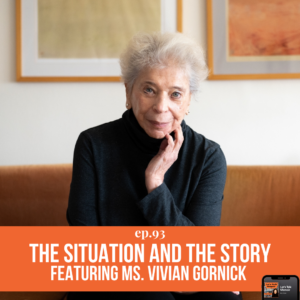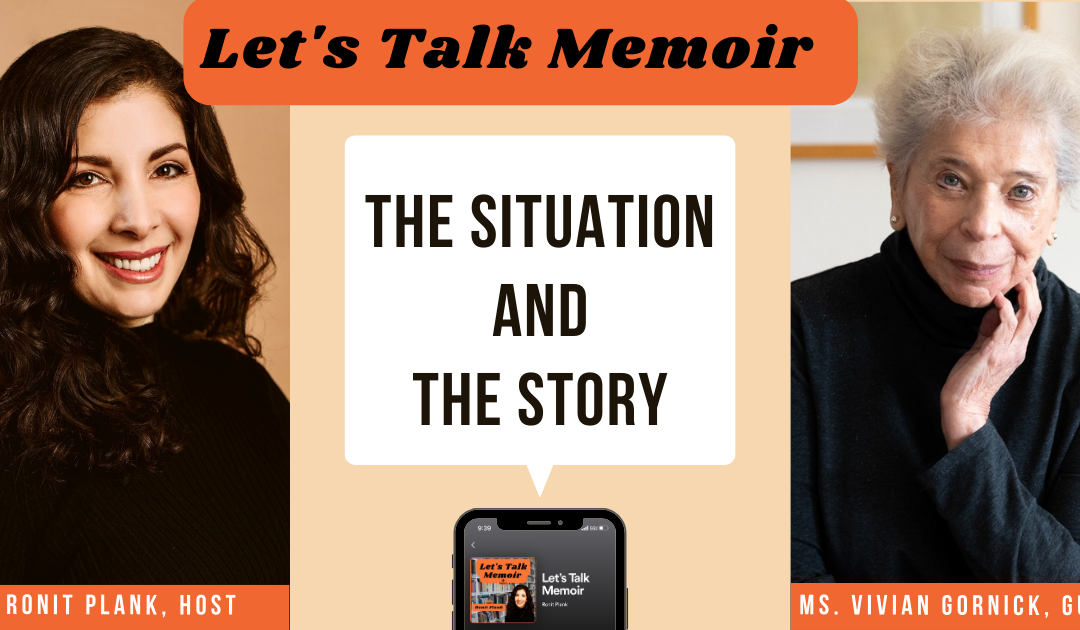Vivian Gornick on Let’s Talk Memoir!
 I am so pleased to announce that acclaimed memoirist, critic, and teacher Ms. Vivian Gornick is my guest on Let’s Talk Memoir. This was a dream come true.
I am so pleased to announce that acclaimed memoirist, critic, and teacher Ms. Vivian Gornick is my guest on Let’s Talk Memoir. This was a dream come true.
I first heard Ms. Gornick’s well-loved and oft-repeated advice: “In order for the drama to deepen we must see the loneliness of the monster and the cunning of the innocent”, in a seminar Debra Gwartney presented when I was getting my MFA. I was studying fiction at the time but had been dabbling in memoir essays here and there and feeling the nonfiction call. It was this seminar, this very moment, that changed my writing trajectory. I began to understand that memoir held vast promise and was complex; that there was far more to my story than I had grappled with or even yet realized.
Talking with Ms. Gornick for Let’s Talk Memoir was a full circle moment for me, an opportunity I never even imagined back when I was writing When She Comes Back. I am grateful to Ms. Gornick for her time and generosity.
In this interview I ask her when she knew she’d arrived at the approach to memoir writing she presents in The Situation and the Story and so evocatively harnesses in her memoir Fierce Attachments. In addition, we talk about why implicating ourselves in our work makes us trustworthy to our reader, how she discovered what her story was truly about, and we also take a look at autofiction. You can listen here.
Your Memoir Questions Answered
“Hi Ronit! … I think on one or two of your podcasts a guest went into explaining writing on proposal vs submitting an entire manuscript. Should memoir always be written on proposal? And do you have any more advice on that? I am wondering what the format is for a proposal. I know the components, but is there a particular form you would fill out and then submit it as a query? I have almost 10,000 words written and have an outline of chapters but wondering if I should work on editing what I have and start focusing on my proposal and query it out at this point. Is there a minimum word count that a query needs? Thanks in advance!” – Lindsay Webster on Substack at @lindsaybrookewebster
Thank you for writing Lindsay and for these thoughtful questions. I’ll break this down into three sections. And these are my opinions and merely suggestions. For every link or resource I include here there are also many more excellent ones, but this is a start.
As with everything in writing and in life, please follow your intuition and what feels right to you.
- Proposal vs. Entire Manuscript for querying
For me this is a bit of a chicken or the egg question because we learn about our memoir and the story we’re trying to tell by writing the whole book, but we also hone our manuscript and what makes our voice and story stand out in the very process of drafting our proposal. Finding the uniqueness in your approach as well as the proven appeal of your story is vital to selling it. I think ideally you would have completed a few drafts of your entire memoir, taking into consideration feedback from your trusted readers, and you have a proposal ready to query. If you would prefer to write only the first 3 chapters of your memoir and are eager to write a crackerjack proposal in order to sell your memoir on proposal and then complete it, that is also a route you can take. My guests on Let’s Talk Memoir, The Witches of Pitches, are all about proposals and you can listen to our conversation here.
Case study: When I was querying When She Comes Back, my memoir about the loss of my mother to the guru Bhagwan Shree Rajneesh and our eventual reconciliation, my manuscript was complete. Several agents asked for fulls (the entire manuscript) to review and several asked for my proposal plus my first 3 chapters. I was surprised they needed a proposal as this was memoir and I’d already written the thing. I felt frustrated and frankly a bit annoyed that not only had I gone through the arduous work of writing and excavating my story, revising, hiring editors, revising, sharing the manuscript with trusted readers, revising again, but now I had to show agents why my story belonged in the world in the first place!? Ugh.
Of course, I now understand when it comes to traditional publishing, they need among other things, to see how they can sell your book, that there’s an audience for it, and that they can make money on it. Your story might be gripping and you might be a beautiful writer but this is a business and agents and publishers don’t have the time or resources or money to invest in a product that won’t sell. When I queried Motina Books, the press who published my memoir, I already had my proposal ready to go and submitted that along with my manuscript.If you’d prefer not to write a proposal, there are memoir contests, indie presses, and university presses that will likely accept your manuscript without one and review your manuscript on its merits alone. I suggest spending time researching the publishers of memoirs similar to the one you’re writing to learn about their preferences and submission opportunities. You can also find out more about indie presses at these listings at Poets & Writers and Reedsy.
- Proposal Format
While there is a general proposal outline memoirists can follow, agencies and indie/university presses often have their own preferences. It’s a good idea to begin by following basic proposal recommendations from trusted sources like Jane Friedman’s How to Write A Book Proposal. Jane Friedman’s site offers a trove of writing resources.Then, as you begin researching agents and presses to query, you can adapt your proposal per their specifications. The difference between requests may be as simple as a reordering of the elements like Comparable Titles and your Marketing Plan, but it’s always a good idea to submit what they want exactly as they ask for it.
- Query letter vs. Proposal
A query letter is a one-page pitch letter about your project and you whereas a proposal is lengthier – anywhere from 35-60 pages usually. The query letter is how you announce yourself to the agent or press you are approaching and grab their attention and interest. You will need a strong query letter regardless of whether you query with a proposal or full manuscript or both. The query letter is key and you can learn more about writing and perfecting yours from many trusted resources including at Jane Friedman’s site.I know this a lot of information. Take your time to digest it and please reach out if you’d like more resources.
Taking your questions
If you have a memoir-writing question you’d like me to address you reach out here or via my website. I’d love to hear from you.
Two Memoir Writing Offerings
1. May 7th Memoir-Ask-Me-Anything
On May 7th Lisa Kefauver, MSW and host of Grief is a Sneaky Bitch joins me for a Memoir Ask-Me-Anything. Have burning questions about writing your story? Wonder if writing memoir can be a generous act? Want tips on how to get started? Join us for an interactive session where you can ask anything related to memoir writing. We’ll begin the hour with the impact on healing memoir can have then we’ll open the floor to your questions. Mark your calendar and don’t miss this opportunity to get valuable guidance and support at this free event! Register here.

2. All About Memoir One-Day Virtual Retreat
I’m thrilled to be joining Bianca Marais of The Shit No One Tells You About Writing on the 11th of May from 10am-5pm ET to teach a workshop as she hosts a one-day virtual retreat specifically for memoirists! My session is Putting the Plot in Your Memoir and we’ll explore how to know whether you have one, tools to help eliminate baggy parts of your manuscript, and four key elements memoirists can harness to amplify tension and stakes in their manuscripts so they crackle with resonance and momentum.
Speakers include:
• Catherine Gildiner – Author of Too Close to the Falls, After the Falls, Coming Ashore and Good Morning, Monster: Five Heroic Journeys to Recovery.
• Chelsea Devantez – Emmy-nominated writer, comedian, and filmmaker. Author of the upcoming memoir, I Shouldn’t Be Telling You This (But I’m Going to Anyway).
• Courtney Maum – Author of five books, including the game changing publishing guide, Before and After the Book Deal,and the memoir, The Year of the Horses.
• Bonny Reichert – Award-winning journalist, chef, and author of the upcoming memoir, How to Share an Egg: A True Story of Hunger, Love and Plenty.
• Abby Maslin – Bestselling author of the memoir, Love You Hard, and a contributing essayist in Moms Don’t Have Time to Have Kids.
• Ronit Plank – Award-winning writer, teacher, and podcaster who hosts Let’s Talk Memoir. Author of the memoir, WhenShe Comes Back and the short story collection Home is a Made-Up Place.
Each 40-minute session will be followed by a 20-minute Q & A in which delegates get to ask the presenters all their burning questions. The retreat will be taped, and the recording will be sent out the next day. The registration fee is US $ 149.00
For more information and to register, go to this link and mention I sent you.

I’m so happy to be able to share these memoir resources with you and appreciate you being here. If you found this post helpful you can subscribe (always free) and share with your friends.
Best wishes for a productive and fulfilling May!

